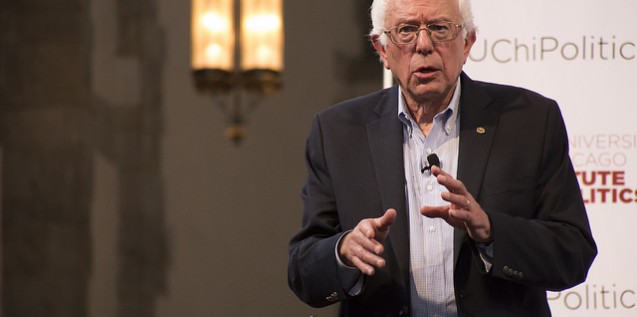U.S. Senator and former 2020 Democratic presidential candidate Bernie Sanders (A.B. ’64) condemned President Donald Trump, criticized the Democratic Party, and endorsed former Vice President Joe Biden at an Institute of Politics webinar hosted by Former Senior Advisor and IOP Executive Director David Axelrod last Friday.
Sanders began by stating his support for 2020 Democratic presidential nominee, Biden, and added that, while he disagreed with Biden on certain policy issues, the costs of a continued Trump presidency outweighed his differences with Biden.
“I consider Donald Trump to be the most dangerous president in the history of this country…If you believe in democracy, if you believe in science, if you believe in civil rights and racial justice, if you believe in the need to combat climate change by transforming our energy system away from fossil fuel, if you happen to believe that healthcare is a human right and all of our people should have it, you know what, you can’t sit out this election,” Sanders said.
Sanders added that though Biden held more conservative policy views than himself, Democratic victories in Congressional races could push Biden to implement more progressive policies.
“After Biden is inaugurated, let’s get to work to make sure that Biden becomes the most progressive president in modern American history. We can do that if we have a Democratic Senate and a Democratic House,” Sanders said.
Sanders characterized Trump’s political success as a result of the Democratic Party’s failure to protect the interests of working-class Americans.
“The Democratic Party has to not only start speaking to but start fighting for the working class, but you can’t do that if you’re beholden to big-money interests,” Sanders said.
Sanders criticized the Electoral College system, which he argued overrepresents some states and unfairly diminishes the needs of larger and more populous states. He pointed to the results of the 2016 presidential election, in which Democratic nominee Hillary Clinton won the popular vote by nearly three million, but lost key electoral votes in swing states.
“There are states voting Republicans and states voting Democrat, who cares about those states? I am deeply worried about Wisconsin, Michigan, and Pennsylvania. We’re listening to the needs of those kinds of states, but that’s not fair to the other 35 states in this country,” Sanders said.
Sanders also described the need for minimizing disinformation campaigns prevalent on social media, which he said harmed meaningful debate.
“We need to do our best through social media and the media in general to create fact-based debates. We can disagree on certain issues, but we should not disagree on the facts,” Sanders said.
Sanders also implored listeners to consider those with opposing politics earnestly. “Treat people who disagree with you with respect. They’re not deplorable; they’re human beings. Once you get to that, you begin to find that there’s a lot more that people have in common than the media tells us,” Sanders said.
Sanders ended by discussing issues of social justice reform and voiced his disagreement with individuals proposing to defund police departments.
“The idea of defunding the police does not make sense to me. What makes sense to me is to understand that police are called upon today to do so many things that are not necessarily police work…Police officers do not necessarily receive the training to deal with issues of mental illness, homelessness, and the issues of young people in the way that they should. I think we’re talking about redefining policing in America, but that doesn’t mean defunding,” Sanders said









